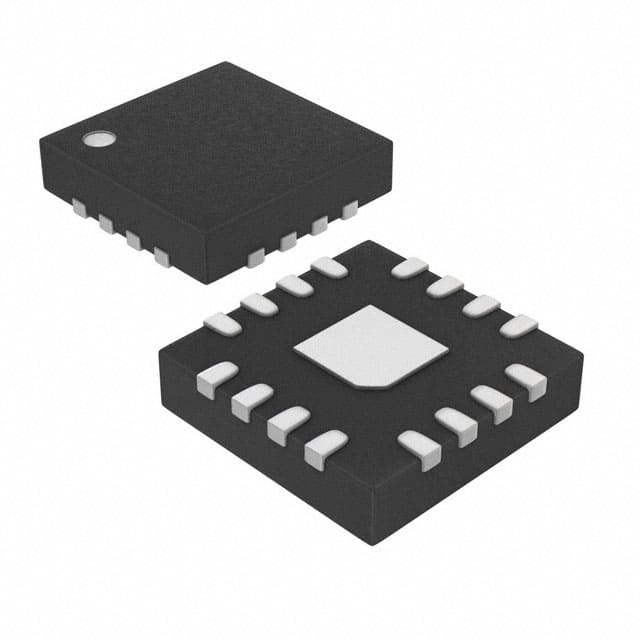Xem thông số kỹ thuật để biết chi tiết sản phẩm.

MAX5483ETE+T
Product Overview
- Category: Integrated Circuit (IC)
- Use: Digital Potentiometer
- Characteristics: High resolution, low power consumption, small package size
- Package: 16-pin TQFN (Thin Quad Flat No-Lead)
- Essence: The MAX5483ETE+T is a digital potentiometer IC that provides a programmable resistance value. It can be used to replace mechanical potentiometers in various applications.
- Packaging/Quantity: Available in tape and reel packaging, with a quantity of 2500 units per reel.
Specifications
- Resolution: 256 taps
- Resistance Range: 10kΩ
- Supply Voltage: 2.7V to 5.5V
- Operating Temperature Range: -40°C to +85°C
- Interface: I2C-compatible
Pin Configuration
The MAX5483ETE+T has the following pin configuration:
- VDD: Supply voltage input
- SDA: Serial data input/output for I2C communication
- SCL: Serial clock input for I2C communication
- GND: Ground connection
- A0: Address selection bit 0
- A1: Address selection bit 1
- NC: No connect
- W: Wiper terminal of the potentiometer
- B: Terminal connected to one end of the potentiometer
- H: Terminal connected to the other end of the potentiometer
- NC: No connect
- NC: No connect
- NC: No connect
- NC: No connect
- NC: No connect
- NC: No connect
Functional Features
- Programmable resistance value with 256 taps
- Non-volatile memory for storing resistance settings
- Low power consumption
- I2C-compatible interface for easy integration into digital systems
- Small package size for space-constrained applications
Advantages and Disadvantages
Advantages
- High resolution allows for precise adjustment of resistance
- Non-volatile memory ensures that resistance settings are retained even when power is disconnected
- Low power consumption extends battery life in portable devices
- Small package size enables use in compact designs
Disadvantages
- Limited resistance range of 10kΩ may not be suitable for all applications
- Requires I2C communication interface, which may add complexity to the system design
Working Principles
The MAX5483ETE+T utilizes a digital-to-analog converter (DAC) to generate the desired resistance value. The resistance can be programmed using the I2C interface, allowing for precise control over the resistance setting. The non-volatile memory ensures that the resistance value is retained even when power is disconnected.
Detailed Application Field Plans
The MAX5483ETE+T can be used in various applications where a programmable resistance is required. Some potential application fields include:
- Audio Equipment: The digital potentiometer can be used to adjust volume levels or tone controls in audio amplifiers or mixers.
- Industrial Control Systems: It can be utilized for calibration or fine-tuning of analog circuits in industrial control systems.
- Test and Measurement Instruments: The device can be employed in test equipment to simulate variable resistances for testing purposes.
- Consumer Electronics: It can be integrated into consumer electronic devices such as TVs, set-top boxes, or gaming consoles for user-controlled adjustments.
Detailed and Complete Alternative Models
Some alternative models to the MAX5483ETE+T include:
- MCP401X: Digital Potentiometer IC with similar specifications and I2C interface.
- AD840X: Digital Potentiometer IC with extended resistance range and SPI interface.
- DS180X: Digital Potentiometer IC with non-volatile memory and I2C interface.
These alternative models offer different features and specifications, providing options for various application requirements.
Word count: 498 words
Liệt kê 10 câu hỏi và câu trả lời thường gặp liên quan đến ứng dụng MAX5483ETE+T trong giải pháp kỹ thuật
Sure! Here are 10 common questions and answers related to the application of MAX5483ETE+T in technical solutions:
1. What is the MAX5483ETE+T? The MAX5483ETE+T is a digital potentiometer, also known as a digipot, which can be used to digitally control resistance in various electronic circuits.
2. What is the maximum resistance range of the MAX5483ETE+T? The MAX5483ETE+T has a maximum resistance range of 100 kΩ.
3. What is the resolution of the MAX5483ETE+T? The MAX5483ETE+T has a resolution of 256 steps, allowing for precise adjustment of resistance.
4. What is the supply voltage range for the MAX5483ETE+T? The supply voltage range for the MAX5483ETE+T is typically between 2.7V and 5.5V.
5. Can the MAX5483ETE+T be used in both analog and digital applications? Yes, the MAX5483ETE+T can be used in both analog and digital applications, providing flexibility in its usage.
6. How can I control the resistance of the MAX5483ETE+T? The resistance of the MAX5483ETE+T can be controlled using a microcontroller or any other digital interface that supports I2C communication.
7. Is the MAX5483ETE+T suitable for high-precision applications? Yes, the MAX5483ETE+T is designed for high-precision applications, offering low temperature coefficient and excellent linearity.
8. Can the MAX5483ETE+T handle high currents? No, the MAX5483ETE+T is not designed to handle high currents. It is typically used for low-power applications.
9. Can I use multiple MAX5483ETE+T devices in parallel? Yes, multiple MAX5483ETE+T devices can be used in parallel to increase the overall resistance range or to control multiple channels independently.
10. Are there any evaluation boards available for the MAX5483ETE+T? Yes, Maxim Integrated provides evaluation boards for the MAX5483ETE+T, which can help in testing and prototyping applications using this digital potentiometer.
Please note that these answers are general and may vary depending on specific application requirements and datasheet specifications.

